-
 Bitcoin
Bitcoin $83,458.2141
-2.67% -
 Ethereum
Ethereum $1,573.6456
-4.30% -
 Tether USDt
Tether USDt $0.9999
0.01% -
 XRP
XRP $2.0723
-3.70% -
 BNB
BNB $581.4005
-1.36% -
 Solana
Solana $125.3253
-5.03% -
 USDC
USDC $0.9999
0.01% -
 TRON
TRON $0.2521
-0.43% -
 Dogecoin
Dogecoin $0.1540
-4.20% -
 Cardano
Cardano $0.6060
-5.85% -
 UNUS SED LEO
UNUS SED LEO $9.3707
-0.67% -
 Chainlink
Chainlink $12.2460
-4.06% -
 Avalanche
Avalanche $18.8097
-5.97% -
 Stellar
Stellar $0.2350
-2.48% -
 Toncoin
Toncoin $2.8686
-1.83% -
 Shiba Inu
Shiba Inu $0.0...01164
-2.94% -
 Sui
Sui $2.0816
-5.70% -
 Hedera
Hedera $0.1573
-6.20% -
 Bitcoin Cash
Bitcoin Cash $320.5595
-3.74% -
 Litecoin
Litecoin $75.7877
-3.38% -
 Polkadot
Polkadot $3.5343
-4.17% -
 Dai
Dai $1.0000
0.02% -
 Bitget Token
Bitget Token $4.2107
-2.77% -
 Hyperliquid
Hyperliquid $14.8217
-8.30% -
 Ethena USDe
Ethena USDe $0.9991
0.01% -
 Pi
Pi $0.6083
-18.46% -
 Monero
Monero $218.6656
2.90% -
 Uniswap
Uniswap $5.1744
-4.43% -
 OKB
OKB $52.3741
0.05% -
 Pepe
Pepe $0.0...07062
-5.76%
What is the Metaverse? How does it relate to blockchain?
Blockchain technology is crucial for the Metaverse, enabling secure transactions and digital ownership through NFTs, fostering decentralized governance and economies.
Apr 14, 2025 at 02:28 am
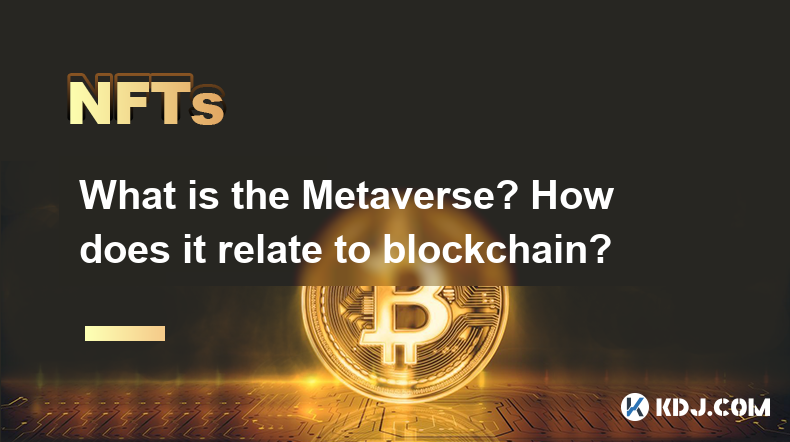
The term Metaverse has been gaining significant attention within the cryptocurrency community and beyond. At its core, the Metaverse represents a collective virtual shared space, created by the convergence of virtually enhanced physical reality and physically persistent virtual space. This concept is not entirely new, but recent advancements in technology and the rise of blockchain have propelled it into the spotlight.
The Metaverse is envisioned as a fully immersive digital universe where users can interact, work, play, and socialize in a three-dimensional environment. This virtual world is not limited by the constraints of the physical world, allowing for limitless possibilities in terms of creativity and functionality. The idea is to create a seamless blend of digital and physical experiences, where users can engage in activities ranging from attending virtual concerts to conducting business meetings.
The Role of Blockchain in the Metaverse
Blockchain technology plays a pivotal role in the development and operation of the Metaverse. At its essence, blockchain is a decentralized ledger system that records transactions across numerous computers, ensuring transparency and security. This technology is crucial for the Metaverse because it provides a foundation for digital ownership, security, and interoperability.
One of the primary ways blockchain integrates with the Metaverse is through non-fungible tokens (NFTs). NFTs are unique digital assets that can represent ownership of virtual items, such as land, art, or avatars within the Metaverse. By using blockchain, these assets can be securely bought, sold, and traded, ensuring that ownership is verifiable and immutable.
Decentralized Governance and Economies
The Metaverse often operates on decentralized governance models, which are facilitated by blockchain technology. In a decentralized Metaverse, decisions about the development and rules of the virtual world are made collectively by its users rather than by a central authority. This approach aligns with the ethos of many cryptocurrency projects, emphasizing community involvement and democratic processes.
Additionally, decentralized economies within the Metaverse are powered by cryptocurrencies and tokens. These digital currencies enable transactions within the virtual world, allowing users to buy, sell, and trade goods and services. The use of blockchain ensures that these transactions are secure and transparent, fostering trust among users.
Interoperability and Scalability
Interoperability is a key feature that blockchain brings to the Metaverse. It allows different virtual worlds and platforms to communicate and interact seamlessly. This means that users can move their digital assets and identities across various Metaverse environments without losing value or functionality. Blockchain standards like ERC-721 and ERC-1155 for NFTs are instrumental in achieving this interoperability.
Scalability is another critical aspect where blockchain technology contributes to the Metaverse. As the Metaverse grows, it needs to handle an increasing number of users and transactions efficiently. Blockchain solutions like layer-2 scaling and sharding are being explored to ensure that the Metaverse can scale without compromising on performance or security.
Security and Privacy
Security and privacy are paramount in the Metaverse, and blockchain technology offers robust solutions in these areas. By leveraging cryptographic techniques, blockchain ensures that data within the Metaverse is secure and that user identities are protected. Smart contracts, which are self-executing contracts with the terms directly written into code, further enhance security by automating and enforcing agreements within the virtual world.
Moreover, blockchain's decentralized nature means that there is no single point of failure, reducing the risk of hacks and data breaches. Users can have greater control over their personal data, deciding what information to share and with whom, which is a significant advantage in the context of the Metaverse.
Real-World Applications and Examples
Several projects are already exploring the intersection of the Metaverse and blockchain. Decentraland is a prime example, where users can buy, sell, and develop virtual land using the MANA cryptocurrency. The platform operates on the Ethereum blockchain, ensuring that all transactions and ownership records are secure and transparent.
Another notable project is The Sandbox, which allows users to create, own, and monetize their gaming experiences using NFTs. This platform also leverages the Ethereum blockchain, enabling users to trade their digital assets freely.
Axie Infinity is another example, where players can earn cryptocurrency by playing the game and breeding digital creatures called Axies. The game uses the AXS token and NFTs to manage ownership and transactions, showcasing how blockchain can create new economic opportunities within the Metaverse.
Challenges and Considerations
While the integration of blockchain into the Metaverse offers numerous benefits, it also presents several challenges. Scalability remains a significant hurdle, as current blockchain technologies can struggle to handle the high transaction volumes required by a fully operational Metaverse. Solutions like layer-2 scaling and sidechains are being developed to address this issue, but they are still in the early stages.
User experience is another critical consideration. The technical complexities of blockchain can be daunting for the average user, potentially hindering widespread adoption of the Metaverse. Simplifying the user interface and providing educational resources will be essential to overcoming this barrier.
Regulatory compliance is also a concern, as the decentralized nature of blockchain and the Metaverse can complicate legal and regulatory frameworks. Governments and regulatory bodies are still grappling with how to approach these new technologies, and clear guidelines are needed to ensure that the Metaverse can operate within legal boundaries.
Frequently Asked Questions
Q: Can I use traditional currencies in the Metaverse, or do I need cryptocurrencies?
A: While some platforms may allow the use of traditional currencies through third-party services, the majority of transactions within the Metaverse are conducted using cryptocurrencies. This is because cryptocurrencies are native to blockchain technology, which underpins the Metaverse's economy and governance. Platforms like Decentraland and The Sandbox primarily use their respective tokens, MANA and SAND, for transactions.
Q: How do I ensure the safety of my digital assets in the Metaverse?
A: To ensure the safety of your digital assets, it's crucial to use secure wallets and follow best practices for managing your private keys. Hardware wallets offer an additional layer of security by storing your keys offline. Additionally, be cautious of phishing attempts and only interact with verified platforms and contracts within the Metaverse.
Q: Are there any entry barriers for new users wanting to join the Metaverse?
A: Yes, there can be entry barriers for new users, primarily related to the technical knowledge required to navigate blockchain and cryptocurrency systems. However, many platforms are working to lower these barriers by providing user-friendly interfaces and educational resources. Additionally, the cost of entry, such as purchasing cryptocurrencies or NFTs, can be a barrier for some users.
Q: How can I participate in the governance of the Metaverse?
A: Participation in the governance of the Metaverse typically involves holding and using the platform's native token. For example, in Decentraland, users can vote on proposals by staking their MANA tokens. Engaging with the community through forums and social media can also provide opportunities to influence the direction of the Metaverse.
Disclaimer:info@kdj.com
The information provided is not trading advice. kdj.com does not assume any responsibility for any investments made based on the information provided in this article. Cryptocurrencies are highly volatile and it is highly recommended that you invest with caution after thorough research!
If you believe that the content used on this website infringes your copyright, please contact us immediately (info@kdj.com) and we will delete it promptly.
- Bitcoin (BTC) Dips Alongside Stock Futures as Nvidia Corp. NVDA Shares Tumble
- 2025-04-16 13:15:13
- Bitcoin (BTC) Faces a Critical Test as Global Markets Remain Volatile and Macroeconomic Tensions Escalate
- 2025-04-16 13:15:13
- Bitcoin (BTC) has been moving between $80,00 and $85,00 for the fourth day as the uncertain market for the U.S.-China trade dispute continues.
- 2025-04-16 13:10:12
- MicroStrategy (Formerly ) Doubles Down on BTC After a Performance in Q1 2025
- 2025-04-16 13:10:12
- Real-world asset-focused coin MANTRA OM/USD Topped The Cryptocurrency Gainers List On Tuesday
- 2025-04-16 13:05:13
- Semler Scientific Files to Issue $500M in Securities Following $30M DOJ Settlement
- 2025-04-16 13:05:13
Related knowledge
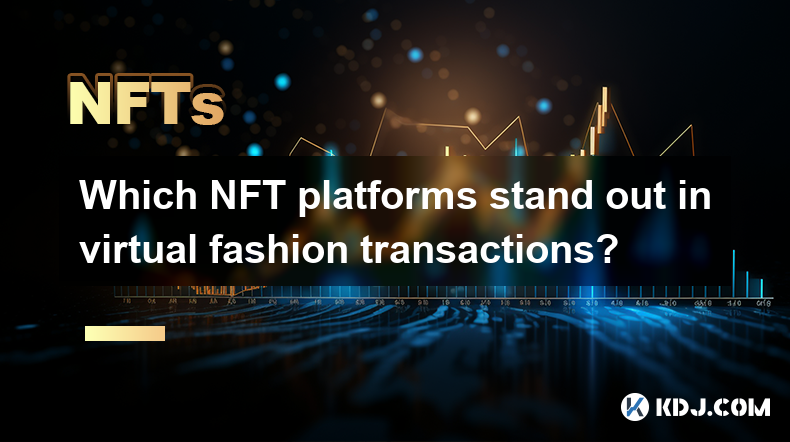
Which NFT platforms stand out in virtual fashion transactions?
Apr 15,2025 at 02:29am
In the dynamic world of cryptocurrency and digital assets, Non-Fungible Tokens (NFTs) have carved out a significant niche, particularly in the realm of virtual fashion. As the demand for unique digital wearables and accessories grows, several NFT platforms have emerged as leaders in facilitating these transactions. This article explores the standout NFT...
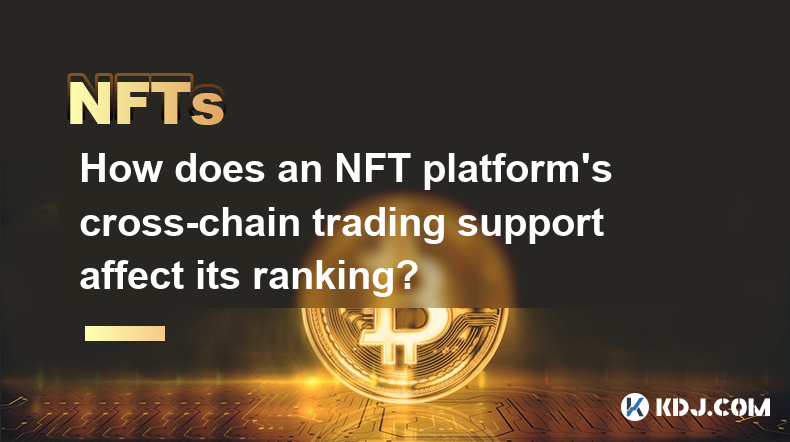
How does an NFT platform’s cross-chain trading support affect its ranking?
Apr 14,2025 at 04:49pm
The impact of an NFT platform's cross-chain trading support on its ranking is a multifaceted topic that delves into the technical capabilities, user experience, and market dynamics of the platform. Cross-chain trading refers to the ability of an NFT platform to facilitate the exchange of non-fungible tokens across different blockchain networks. This fea...
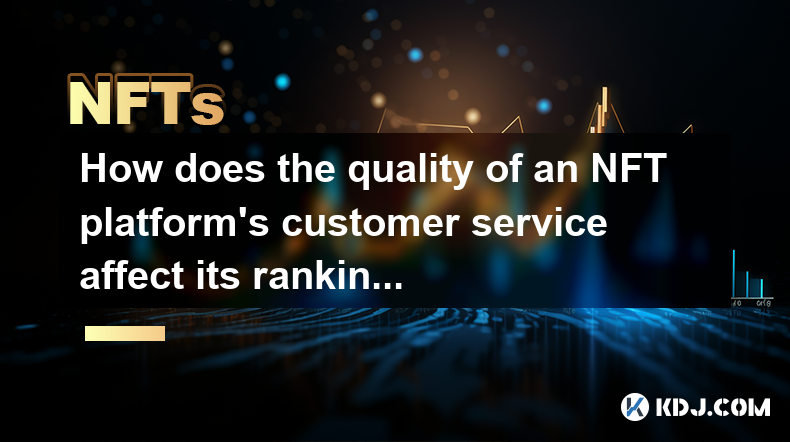
How does the quality of an NFT platform’s customer service affect its ranking?
Apr 15,2025 at 05:49am
The quality of an NFT platform's customer service plays a crucial role in determining its ranking within the competitive landscape of the cryptocurrency and NFT market. Customer service is often the bridge between a platform and its users, directly impacting user satisfaction, trust, and overall experience. This article delves into how different aspects...
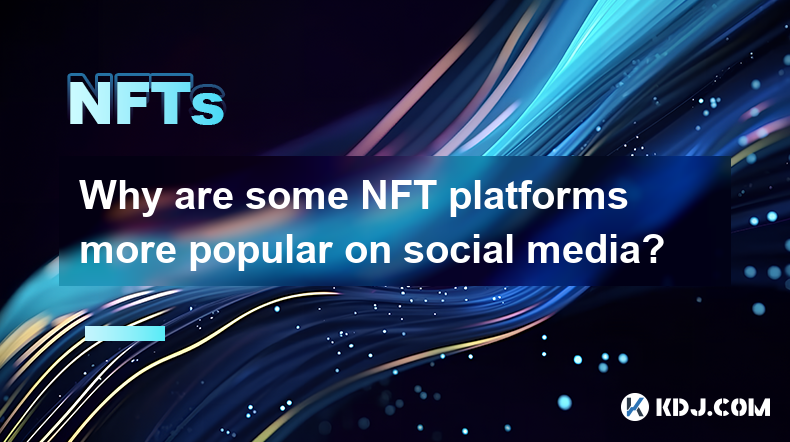
Why are some NFT platforms more popular on social media?
Apr 15,2025 at 01:00am
The popularity of NFT platforms on social media can be attributed to a variety of factors that influence their visibility, engagement, and overall appeal to users. Understanding these factors can provide insights into why certain platforms capture more attention and interaction on social media channels. User Experience and InterfaceUser experience (UX) ...
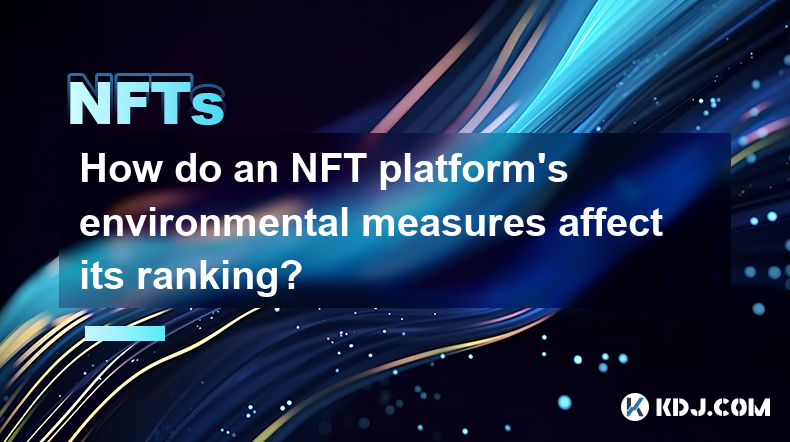
How do an NFT platform’s environmental measures affect its ranking?
Apr 15,2025 at 02:14am
The impact of an NFT platform's environmental measures on its ranking is a topic of growing importance within the cryptocurrency circle. As the digital art and collectibles market grows, so does the scrutiny over the environmental footprint of the blockchain technologies that support these platforms. This article will delve into how these environmental ...
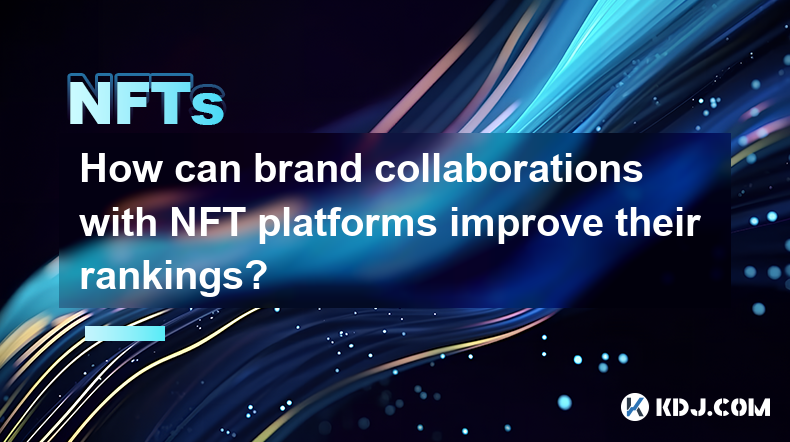
How can brand collaborations with NFT platforms improve their rankings?
Apr 15,2025 at 01:35am
Brand collaborations with NFT platforms have become increasingly popular in the cryptocurrency circle, offering a unique way to enhance visibility and rankings. By leveraging the strengths of both brands and NFT platforms, these collaborations can drive engagement, increase user base, and ultimately improve rankings on various metrics. In this article, ...

Which NFT platforms stand out in virtual fashion transactions?
Apr 15,2025 at 02:29am
In the dynamic world of cryptocurrency and digital assets, Non-Fungible Tokens (NFTs) have carved out a significant niche, particularly in the realm of virtual fashion. As the demand for unique digital wearables and accessories grows, several NFT platforms have emerged as leaders in facilitating these transactions. This article explores the standout NFT...

How does an NFT platform’s cross-chain trading support affect its ranking?
Apr 14,2025 at 04:49pm
The impact of an NFT platform's cross-chain trading support on its ranking is a multifaceted topic that delves into the technical capabilities, user experience, and market dynamics of the platform. Cross-chain trading refers to the ability of an NFT platform to facilitate the exchange of non-fungible tokens across different blockchain networks. This fea...

How does the quality of an NFT platform’s customer service affect its ranking?
Apr 15,2025 at 05:49am
The quality of an NFT platform's customer service plays a crucial role in determining its ranking within the competitive landscape of the cryptocurrency and NFT market. Customer service is often the bridge between a platform and its users, directly impacting user satisfaction, trust, and overall experience. This article delves into how different aspects...

Why are some NFT platforms more popular on social media?
Apr 15,2025 at 01:00am
The popularity of NFT platforms on social media can be attributed to a variety of factors that influence their visibility, engagement, and overall appeal to users. Understanding these factors can provide insights into why certain platforms capture more attention and interaction on social media channels. User Experience and InterfaceUser experience (UX) ...

How do an NFT platform’s environmental measures affect its ranking?
Apr 15,2025 at 02:14am
The impact of an NFT platform's environmental measures on its ranking is a topic of growing importance within the cryptocurrency circle. As the digital art and collectibles market grows, so does the scrutiny over the environmental footprint of the blockchain technologies that support these platforms. This article will delve into how these environmental ...

How can brand collaborations with NFT platforms improve their rankings?
Apr 15,2025 at 01:35am
Brand collaborations with NFT platforms have become increasingly popular in the cryptocurrency circle, offering a unique way to enhance visibility and rankings. By leveraging the strengths of both brands and NFT platforms, these collaborations can drive engagement, increase user base, and ultimately improve rankings on various metrics. In this article, ...
See all articles























































































